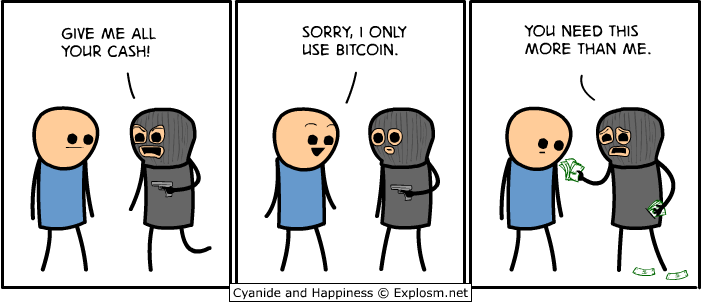Bitcoin’s transaction fees have surged in the past 6 months.
A common retort to this issue from the Bitcoin community is that Bitcoin is not meant to be spent, only to be saved and then cashed out. There are many problems with this, and I don’t believe that most people who say it mean it. It is a self-soothing exercise until fees come down.
If Bitcoin is not accepted for goods then its value depends entirely on the fiat system. Buy Bitcoin with cash, HODL, sell Bitcoin for cash. The US Government can easily stop Bitcoin by simply closing the doors on USD/BTC transactions.
If Bitcoin could actually be used for something then the network effects could conceivably make it self-sustaining. This is not a given however it certainly improves the chances of Bitcoin surviving. (Yes I know you can buy things with bitcoin but who wants to pay the fees?)

Cash vs Credit
Deep down both sides of the Bitcoin Core vs Bitcoin Cash argument know that commerce is an important use case for Bitcoin. The differences can be boiled down to which trade-offs (ie fees, block time, etc.) should be made to allow commerce to happen ‘at scale’.
Roger Ver and Jameson Lopp engaged in a thoughtful debate on the Tom Woods Show.
TLDW;
Bitcoin Core: Blockchains don’t scale long term and the best way to gain mass adoption is via Layer 2 solutions like Lightning Network that will handle transactions and then be settled on the blockchain. This follows best practice of how the Internet works, where not everyone needs knowledge of all the content for it to work.
Bitcoin Cash Rebuttal: These Layer 2 solutions don’t yet exist, and even when they do, batching transactions is by default centralizing and Bitcoin was running just fine until the 1MB blocksize limit was hit. [I would add — Lightning Nodes are likely money transmitters and would be subject to those laws.]
Bitcoin Cash: Technology is keeping pace with blocksize requirements just fine, and Bitcoin operated without an effective blockchain limit up until blocks became full circa 2016. Expand the blocksize and then *if* layer 2 solutions work and are required, adopt them as needed
Bitcoin Core Rebuttal: Increased blocksizes will lead to more centralized mining due to hardware requirements which can be censored, this is especially true if mass adoption was to happen. There are cheaper alt coins that handle on-chain transmissions better than Bitcoin Cash, some even claiming to do it in under 5 seconds and for free. Also the current blocksize is not being utilized efficiently as most exchanges aren’t even optimizing current transactions using SegWit.
My Take
Bitcoin will be fine. Which one ends up being the ‘true’ Bitcoin in the long run is up for debate.
The differences in the current state of performance are visualized nicely by txhighway.com
I get nervous when development teams ignore the current needs of users to solve for some problem in the future. High fees are a big problem, and it is not a universal truth that Bitcoin is headed for mass adoption even with high fees and slow confirmation times. It is hard to evaluate the claims of the Lightning Network, because it does not exist in the wild.
Overall, I like Bitcoin Cash for the near term, but it is hard to argue that *if* the lightning network can do all it says, then Bitcoin Core is superior. Even if it works out, certainly Bitcoin Cash could adopt it and support even cheaper transactions.
Further Reading
For a more-detailed breakdown of the differences between Bitcoin and Bitcoin Cash check out Vinny Lingham’s breakdown




